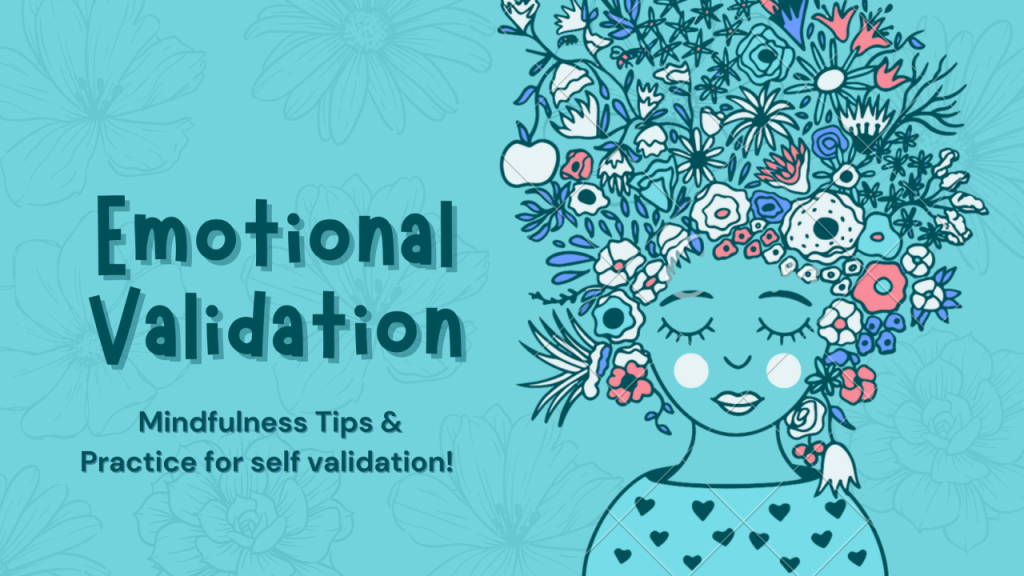Contents
- 1 What Is Validation?
- 2 What Is Emotional Invalidation?
- 3 Types Of Invalidation
- 4 Symptoms Of Emotional Invalidation
- 5 Causes Of Emotional Invalidation
- 6 Benefits Of Emotional Invalidation
- 7 Effects Of Emotional Invalidation
- 8 How To Deal With Emotional Invalidation?
- 9 How To Save Someone From Emotional Invalidation?
- 10 Prevention Of Emotional Invalidation
- 11 Tips To Emotionally Validate
- 12 Conclusion
- 13 A Word From Therapy Mantra
What Is Validation?

Validation is a term used in psychology to describe the process of providing feedback to a person that their thoughts or feelings are understandable and acceptable. It can be contrasted with invalidation, which is the process of indicating that a person’s thoughts or feelings are not understandable or acceptable.
You are constantly invalidated by the people closest to you, but even if you’re sure that something is bothering them, it’s hard to get them to open up and talk. And when they do finally get the courage to tell you what’s wrong, they don’t seem like themselves anymore. This has been a problem of mine for quite some time now, but one evening I was able to break through this barrier and find out what was really bugging my friend. It made all the difference in our friendship-I’m glad I didn’t give up.
What Is Emotional Invalidation?
Emotional invalidation is a type of emotional abuse where the victim’s feelings are dismissed or ignored. It can be done deliberately or subconsciously. The purpose of emotional invalidation is to make the victim feel like their feelings don’t matter and that they are not worth attention or respect.
Emotional invalidation can have a number of harmful effects on the victim. It can make them feel insecure and uncertain of themselves. It can lead to depression, anxiety, and other mental health issues. Emotional invalidation can also cause the victim to become isolated and withdrawn.
Types Of Invalidation

There are other types of invalidation that can be just as harmful as emotional invalidation.
Intellectual invalidation
One example is intellectual invalidation. This is when a person’s thoughts or ideas are dismissed or ignored. It can make the victim feel like their thoughts are not worth considering and that they are not smart or intelligent.
Physical invalidation
Another type of invalidation is physical invalidation. This is when a person’s body is ignored or dismissed. It can make the victim feel like their body is not important and that they are not worth caring for.
Social invalidation
Finally, there is social invalidation. This is when a person’s social interactions are dismissed or ignored. It can make the victim feel like they are not worth talking to or interacting with others.
Symptoms Of Emotional Invalidation
Emotional invalidation can cause the victim to experience a range of symptoms, including but not limited to:
- Feeling insecure and uncertain of themselves
- Experiencing a lot of anxiety or depression
- Having low self-esteem
- Feeling isolated and withdrawn
- Having trouble trusting others
- Feeling like their feelings don’t matter
Causes Of Emotional Invalidation

There can be any number of reasons why someone might emotionally invalidate another person. Some common causes include:
- Wanting to control the other person
- Feeling threatened by the other person’s feelings or emotions
- Feeling like the other person’s feelings are inconvenient or too much work
- Having a negative view of emotions and feelings in general
Emotional invalidation can be a very harmful way to treat someone. It can cause them to feel insecure and uncertain of themselves, lead to depression, anxiety, and other mental health issues, and cause them to become isolated and withdrawn. If you notice that you or someone you know is experiencing these symptoms, it is important to seek help. There are many resources available to you. Talk to a therapist, join a support group, or reach out to a friend. You are not alone.
Benefits Of Emotional Invalidation
There can be some benefits to emotional invalidation, even though it is generally seen as a harmful thing.
- One benefit is that it can make the victim feel like their feelings don’t matter. This can be helpful in some situations where the victim’s feelings are causing them a lot of pain or are not constructive.
- Another benefit is that it can cause the victim to become more independent and strong. The victim learns that they cannot rely on others to validate their feelings or to take care of them. They learn how to take care of themselves and how to deal with difficult emotions on their own.
Emotional invalidation can also cause the victim to become more aware of their own emotions and how to deal with them. They
Effects Of Emotional Invalidation
Emotional invalidation can be a very harmful way to treat someone. It can cause them to feel-

- Insecure and uncertain of themselves
- Lead to depression
- Anxiety
- Other mental health issues
- Isolated and withdrawn
If you notice that you or someone you know is experiencing these symptoms, it is important to seek help. There are many resources available to you. Talk to a therapist, join a support group, or reach out to a friend. You are not alone.
How To Deal With Emotional Invalidation?
If you find that you are constantly being dismissed or ignored by someone, it can be very frustrating and discouraging. You may feel like your feelings don’t matter and that you are not worth attention or respect. This can lead to a lot of mental health issues such as depression, anxiety, and low self-esteem.
There are a few things you can do to deal with emotional invalidation:
Talk to someone
Talk to someone about how you’re feeling. It can be very helpful to express yourself to someone who will listen and understand. Talk to a friend, family member, therapist, or any other supportive person.
Create a support system
Surround yourself with people who make you feel good about yourself. Spend time with friends who make you feel loved and supported. This can help counteract the negative effects of emotional invalidation.
Focus on your own happiness
Don’t let someone else’s dismissal of your feelings keep you from being happy. Focus on things that make you happy and don’t let someone else’s negativity drag you down.
Seek professional help

If the emotional invalidation is causing you significant distress, it may be helpful to seek professional help. A therapist can provide you with support and guidance as you work through these issues.
Emotional invalidation can be a very harmful way to treat someone. It can cause them to feel insecure and uncertain of themselves, lead to depression, anxiety, and other mental health issues, and cause them to become isolated and withdrawn. If you notice that you or someone you know is experiencing these symptoms, it is important to seek help. There are many resources available to you. Talk to a therapist, join a support group, or reach out to a friend. You are not alone.
How To Save Someone From Emotional Invalidation?
Emotional invalidation can be very damaging to someone’s self-esteem and can make them feel like they’re not good enough or that their feelings don’t matter. If you or someone you know is experiencing emotional invalidation, there are steps you can take to help them.
Understand what it is
The first step in helping someone who is experiencing emotional invalidation is to understand what it is. Emotional invalidation is when someone’s emotions or feelings are dismissed, ignored, or devalued. It can be very damaging to someone’s self-esteem and can make them feel like they’re not good enough or that their feelings don’t matter.
Validate the person’s emotions
The next step is to validate the person’s emotions. This means that you should show that you understand and sympathize with how they’re feeling. You can do this by saying things like “I can see why you would feel that way” or “I know how you must be feeling”. Validating someone’s emotions will help them feel heard and understood, which can be very healing.
Help the person communicate their feelings
Another step is to help the person communicate their feelings. This can be done by asking them how they’re feeling and then listening without judging. It can also be helpful to express your own feelings in a safe and supportive environment. This will help the person feel like they’re not alone in their emotions and that they can trust you to keep them safe.
Support the person’s healing process
The next step is to support the person’s healing process. This can involve taking care of yourself and providing emotional support. It can also mean helping the person seek professional help if needed. No one heals overnight, so be patient and keep supporting the person until they feel better.
Prevention Of Emotional Invalidation

Prevention of emotional invalidation starts with recognizing the signs and symptoms of this type of abuse. It’s important to remember that emotional invalidation can occur in any relationship, not just romantic ones.
The best way to prevent emotional invalidation is to be aware of the signs and symptoms and to know what to do if you or someone you know is experiencing it. If you think you or someone you know is being emotionally invalidated, here are some steps to take:
1. Talk to someone you trust about what’s going on.
2. Seek professional help.
3. Distance yourself from the person who is emotionally invalidating you.
4. Set boundaries and limits with that person.
5. Find support from friends, family, and/or a support group.
6. Take care of yourself both physically and emotionally.
7. Don’t be afraid to stand up for yourself and speak up about what’s going on.
8. Stay strong and don’t give up.
It’s important to remember that you are not alone in this. There are people who can help you through this, and there is light at the end of the tunnel. You deserve to be happy and healthy, and you can get there with time, patience, and effort.
Tips To Emotionally Validate

When someone is emotionally invalidated, it can be difficult to know how to support them. However, there are a few things you can do to help them feel validated and understood.
1) Listen without judgment. When someone is sharing their emotional experience, they need to feel heard and understood. Resist the urge to judge them or offer solutions, and simply listen.
2) Acknowledge their feelings. It can be very helpful for the person who is feeling invalidated to know that their feelings are valid. A simple statement such as “I can see that you’re feeling really angry/sad/upset” can make a big difference.
3) Don’t dismiss their feelings. One of the worst things you can do is dismiss someone’s feelings as being unimportant. Their emotions are just as real to them as yours are to you, so take them seriously.
4) Validate their experience. It’s important to validate the person’s experience, not just their feelings. Show that you understand what they’re going through by using phrases such as “That sounds really tough” or “I can see why that would be hard for you.”
5) Offer support. Once the person has felt heard and understood, offer your support. Let them know that you’re there for them and that you want to help however you can.
By following these tips, you can help the person who is feeling emotionally invalidated to feel supported and understood.
When someone is emotionally invalidated, it can be difficult to know how to support them. However, there are a few things you can do to help them feel validated and understood.
Conclusion
Emotional invalidation is a type of emotional abuse where the abuser regularly dismisses, negates, or diminishes the feelings of their partner. This can be done through verbal comments, nonverbal cues, or even just by being emotionally unavailable. Emotional invalidation can have a serious impact on the victim’s self-esteem and mental health, leading to issues such as depression, anxiety, and posttraumatic stress disorder (PTSD). If you feel like you’re in an emotionally invalidating relationship, it’s important to reach out for help. We have many resources available to victims of emotional abuse, including counseling and therapy services. You don’t have to suffer in silence – there is support out there for you.
A Word From Therapy Mantra
Your mental health — Your psychological, emotional, and social well-being — has an impact on every aspect of your life. Positive mental health essentially allows you to effectively deal with life’s everyday challenges.
At Therapy Mantra, we have a team of therapists who provide affordable online therapy to assist you with issues such as depression, anxiety, stress, workplace Issues, addiction, relationship, OCD, LGBTQ, and PTSD. You can book a free therapy or download our free Android or iOS app.


